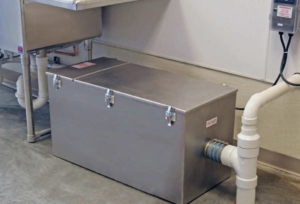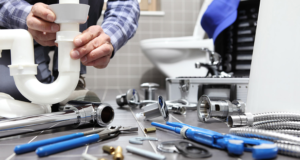Restaurants, bars, and other food service establishments that produce large amounts of grease waste need to install grease traps or interceptors and maintain them properly.
Regular cleaning, inspections, and training are key. Consistently adding the right chemicals helps break down the FOGs in a grease trap and reduces the risk of costly blockages. Contact Grease Trap Perth now!

Grease traps (and interceptors) prevent fats, oils, and grease (FOG) from leaving kitchen facilities and entering the public sewer system. FOG in the sewer system causes blockages and sanitary sewer overflows (SSOs), which require costly specialized equipment, time, and labor to clean up. Municipalities, therefore, require that establishments that prepare food install and maintain a grease trap.
Whether the trap is buried underground or located within a drain in the facility, it should be cleaned/pumped out on a regular basis. The frequency depends on the type of food served and the size of the trap, but typically a commercial kitchen should have their grease trap emptied and cleaned every 1-3 months.
The best way to keep your trap functioning properly is to make sure that all staff members follow proper hygienic practices and dispose of waste food properly. Disposing of solid food waste in the garbage will reduce how often the grease trap needs to be pumped. Also, implementing a daily routine of scraping plates and utensils will minimize odors as well as the amount of FOG that makes its way into the trap.
Avoid using chemical additives, bio enzymes or drain cleaners on your grease trap. These chemicals kill the bacteria in the grease trap, which means that the FOG will not be broken down and removed from the plumbing system. Rather than risking the health and safety of your employees and customers, hire a professional grease trap cleaning company like Crews Environmental to handle the task.
Another important tip is to have your trap inspected by a professional on a regular basis. This will ensure that your trap is working correctly and will help you to determine if any repairs are needed. Having your grease trap inspected and repaired regularly will also save you money in the long run by preventing costly sewage backups and the need to repair extensive damage to internal plumbing.
Don’ts
Grease traps are an essential part of functional drains in kitchen environments that produce a high volume of FOG. They help prevent clogs, sewer blockages, and backups by separating grease from the wastewater that runs through your kitchen sinks and other drains into the sanitary sewer system.
It’s important to have your grease trap sized correctly for the amount of cooking and sink output that you have in your kitchen. If you are not sure what size to choose, it is best to consult a professional or a manufacturer for guidance. It’s also advisable to find out the specific regulations and requirements for your local area regarding the installation of grease traps.
Another thing that you don’t want to do is to allow your FOG-laden waste to flow into the sewage system without having it properly pumped. FOG in the sewage system can cause toxic fumes that are damaging to the environment and can even cause blockages. It can also lead to hefty fines for your business.
You should regularly have your grease trap pumped by professionals. This will reduce the buildup of grease and help your kitchen run smoothly and efficiently. The experts will have all the proper equipment to thoroughly clean and remove the grease from the trap. They will also be able to detect any issues with the trap before they become severe.
Keeping your grease trap clean is one of the most important things you can do for the health and safety of your kitchen staff, customers, and neighbors. It will also help protect your drainage system and the surrounding natural environment from damage caused by solidified grease.
The most obvious sign that your grease trap needs to be cleaned is a foul odor in the air. If you notice this, it is a good idea to have it cleaned immediately. This will help to avoid any further clogs and blockages in your kitchen drains and will also prevent the smell from overwhelming the building. It is best to hire a professional cleaning service that can also dispose of the waste properly in accordance with local regulations.
Maintenance
When your grease trap is not cleaned on schedule, it can lead to plumbing issues including clogged drains, wastewater backups, and unpleasant odors. This leads to expensive repair bills and lost business while your kitchen is closed for cleaning or repairs. It can also affect the quality of food you serve, and even put customers off from returning.
Regular pumping of your grease trap ensures that it is functional and helps to reduce the amount of FOGs that enter the sewer system. Grease traps are designed to intercept fats, oils, and greases before they reach the sanitary sewer lines where they can solidify and block pipes. Regular cleanings help to prevent this and can save you money in both repairs and fines from local health and environmental inspectors.
Local and state health and environmental regulations require that grease traps be pumped and cleaned regularly. Failure to comply can result in hefty fines and even closure of your business. Regular service helps to avoid these costly penalties and demonstrates your commitment to responsible FOG disposal.
A professional cleaning company will use special pumps to remove the accumulated FOGs and solids from the trap, scraping and cleaning the interior surfaces. They will then dispose of the waste following environmental regulations. This process is best done on a scheduled basis, with services typically performed during off-peak hours to minimize disruption to your restaurant’s operations.
It is important to educate your kitchen staff about what is and isn’t appropriate for the FOG disposal system. Educating them on how to properly dispose of unused fryer oil in designated containers and being cautious about what they put down the drain will reduce the need for regular grease trap maintenance.
If you have a smaller space available or don’t have the budget to invest in a larger gravity-type grease trap, a high-capacity grease interceptor may be an option for your establishment. These units are designed to be unobtrusive, and they can be mounted in a corner or underneath a sink. They are also capable of storing more liquid than traditional grease traps, which can save you money on pumping fees.
Emergency
Grease traps protect drains in your kitchen by reducing the amount of fats, oils, and grease (FOG) that goes down the sinks and into the sewer system. They are important for restaurants, bakeries, coffee shops, bars, and any facility that uses a lot of cooking equipment. FOGs can stick to the inside of sewer pipes and cause clogs. Grease traps prevent this by filtering out the FOGs and directing them into a separate drainage system.
The most important thing to remember about a grease trap is that it needs to be cleaned regularly. The longer you wait between cleanings, the more likely your grease trap will overflow. This is a health and safety hazard for your employees and customers, and it can also lead to costly plumbing repairs.
To avoid a grease trap emergency, you should schedule regular cleanings by a non-hazardous waste removal company that can provide both trap pumping and hydro jetting services. A reliable service provider will also keep records of the last time each device was cleaned, ensuring that your business is always in compliance with city ordinances.
An emergency situation can occur when the trap is completely full of gummy grease and solids. This is usually due to not having enough grease disposed of, or it may be caused by a breakdown in the internal workings of the trap. In either case, an overflow can damage the interior of your restaurant and require expensive plumbing repair.
When an emergency occurs, you should turn off all of the equipment connected to your trap. You should also shut off the water supply to your kitchen and use a plastic scraper to remove as much grease and solids from the trap as possible. This should be done while wearing rubber gloves and a gas mask to protect yourself from potential splashes and chemical exposure. Once you’ve removed as much grease and solids from the trap, you should put them into heavy-duty trash bags for proper disposal.
If you have a high-FOG environment, it’s essential to hire professional plumbers for regular grease trap cleaning. It’s less expensive to have your grease trap cleaned regularly than it is to deal with an emergency clog and expensive plumbing repair.
